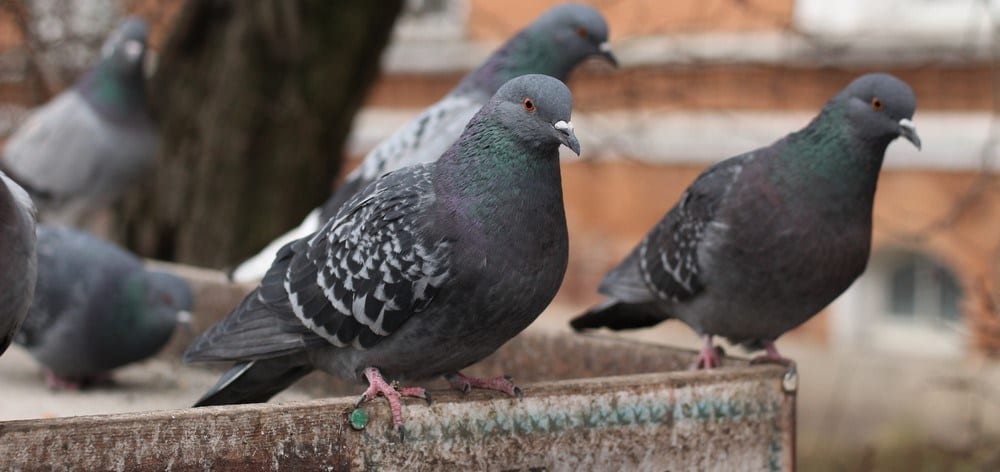
Why Are There So Many Pigeons In The Cities?
Ever thought about why there are so many pigeons in your city? I have, I always notice a flock of pigeons hanging out on posts and rooftops and individually roaming the streets. But why are there so many? Keep on reading to find out! It may surprise you.
Pigeons In The City
Well, the first thing you need to know about pigeons is that they’re actually doves. Or doves are actually pigeons. Scientifically, there’s no difference between the two.
“In some languages, there isn’t even a separate word for ‘pigeon,’ ” said Colin Jerolmack, a scientist at New York University who studies human societies.
There are still pigeons living in the wild today. They evolved on the shores of North Africa and the Mediterranean Sea, where they make their homes on rocky ledges and cliffs. And it was this natural love for hard surfaces that made them a perfect fit in urban areas.
“They actually really like concrete, marble and stone, so they prefer to live and build nests not in the trees and shrubs and grass, but alongside buildings,” said Jerolmack, who wrote a book called “The Global Pigeon.”
But perhaps the biggest reason you’ll find pigeons in cities around the world is because humans brought them there.
At least as long as 5,000 years ago, the people of an ancient Middle Eastern civilization known as Mesopotamia started putting out houses for these birds. As the birds became more tame, people began breeding them for food in areas where other wild animals had become scarce.
Later, people learned that they could also use pigeons to carry written messages over long distances, thanks to the birds’ homing instinct.
“You can take a street pigeon in D.C. and drive it down to North Carolina and release it, and, more often than not, it’ll find its way home,” Jerolmack said.
As you can see, pigeons can be quite useful. It’s been only in the past 80 to 100 years that people started disliking the birds, Jerolmack said. And much of the dislike comes from misunderstanding.
For example, there’s really no solid evidence that pigeons pass diseases on to people. And once you get to know them, you might change the way you think.
Did you know that pigeons mate for life, for instance? Or that once their chicks hatch, both parents take turns feeding their young a liquid produced in their digestive tract called “crop milk?”
Anyway, humans have only themselves to blame for the pigeons cooing on every corner.
“We bred them and domesticated them, and kept them in cities as we developed cities,” Jerolmack said. “So they’ve always been here, from the beginning.”
There are still pigeons living in the wild today. They evolved on the shores of North Africa and the Mediterranean Sea, where they make their homes on rocky ledges and cliffs. And it was this natural love for hard surfaces that made them a perfect fit in urban areas.
“They actually really like concrete, marble and stone, so they prefer to live and build nests not in the trees and shrubs and grass, but alongside buildings,” said Jerolmack, who wrote a book called “The Global Pigeon.”
But perhaps the biggest reason you’ll find pigeons in cities around the world is because humans brought them there.
At least as long as 5,000 years ago, the people of an ancient Middle Eastern civilization known as Mesopotamia started putting out houses for these birds. As the birds became more tame, people began breeding them for food in areas where other wild animals had become scarce.
Later, people learned that they could also use pigeons to carry written messages over long distances, thanks to the birds’ homing instinct.
“You can take a street pigeon in D.C. and drive it down to North Carolina and release it, and, more often than not, it’ll find its way home,” Jerolmack said.
As you can see, pigeons can be quite useful. It’s been only in the past 80 to 100 years that people started disliking the birds, Jerolmack said. And much of the dislike comes from misunderstanding.
For example, there’s really no solid evidence that pigeons pass diseases on to people. And once you get to know them, you might change the way you think.
Did you know that pigeons mate for life, for instance? Or that once their chicks hatch, both parents take turns feeding their young a liquid produced in their digestive tract called “crop milk?”
Anyway, humans have only themselves to blame for the pigeons cooing on every corner.
“We bred them and domesticated them, and kept them in cities as we developed cities,” Jerolmack said. “So they’ve always been here, from the beginning.” Source

About Pigeon Patrol:
Pigeon Patrol Products & Services is the leading manufacturer and distributor of bird deterrent (control) products in Canada. Pigeon Patrol products have solved pest bird problems in industrial, commercial, and residential settings since 2000, by using safe and humane bird deterrents with only bird and animal friendly solutions. At Pigeon Patrol, we manufacture and offer a variety of bird deterrents, ranging from Ultra-flex Bird Spikes with UV protection, Bird Netting, 4-S Gel and the best Ultrasonic and audible sound devices on the market today.
Contact us at 1- 877– 4– NO-BIRD, (604) 585-9279 or visit our website at www.pigeonpatrol.ca
Pigeon / Pigeon Patrol / Pigeons Roosting / Vancouver Pigeon Patrol / Bird Control / Surrey Pigeon Control / Pest / Vancouver Pigeon Blog / Birds Inside Home / Pigeons in the cities
